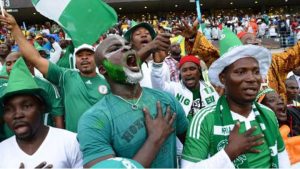By Safwan Abubakar


Nigeria stands out as a powerhouse of passion and expectation. The Super Eagles, embodying the nation’s rich football legacy, have consistently portrayed exceptional talent, captivating fans globally with their dynamic style and storied history. Their iconic green jerseys have become synonymous with African football excellence.
However, alongside their successes —such as clinching the Olympic gold medal in the unforgettable 1996 Atlanta Games and shining in the Africa Cup of Nations multiple times—the Super Eagles have endured deep and profound heartbreak, particularly in their quest for 2026 FIFA World Cup qualification.
As they are struggling in the current qualifying campaign for the 2026 World Cup, the team’s struggles have resurfaced haunting memories for supporters. The recent disappointing 1-1 draw against bitter rivals Bafana Bafana of South Africa, has reignited frustrations and dashed hopes, reminding fans of the unfulfilled potential of a team that has often been on the level of greatness but has narrowly missed the mark on the world’s biggest stage.
This journey has reminded Nigerian football fans of their past failures to qualify for the world’s biggest tournament
Failure After Failure
History shows that Super Eagles failed to qualify for the FIFA World Cup 4 times, starting from the 1978 campaign in Argentina, which ended in a particularly painful fashion. After a promising run, only for an unfortunate own goal by star defender Godwin Odiye in a match against Tunisia to end their hopes.
Some years later, the Super Eagles’ dream of qualifying also collapsed as their rivals Cameroon defeated them in a final group game of the 1990 World Cup Qualifier.
The most Shocking Nigerian World Cup qualification Failure was that of 2006, where the Super Eagles had a strong team and the best players like Jay-Jay Okocha, Joseph Yobo, Nwankwo Kanu, and others, yet finished third in their group phase and failed to qualified. This disappointment of 2006 still lingers in the minds of many fans as a monumental failure of a golden opportunity.
The recent disappointment for the Super Eagles was their failure to qualify for the 2022 World Cup in Qatar. After a smooth run in the group stage, Nigeria faced their arch-rivals, the Black Stars of Ghana, in a two-legged playoff. Unfortunately, they disappointed their fans with an unexpected failure.
However, their current qualification campaign has been anything but smooth, leaving their hopes hanging by a thread. Super Eagles remain in third position of the group with eleven points, three points behind the second place with two matches left.
The Super Eagles face a daunting challenge in their 2026 World Cup campaign. To revive their qualification hopes, they’ll need to deliver convincing victories against Lesotho and Benin Republic while relying on favorable results from other matches, particularly South Africa’s potential slip-ups
Football Expert’s Thought
The former Super Eagles Superstar, John Obi Mikel expressed his deep disappointment concerning the Super Eagles performance stating that NFF executives should resign if Nigeria fails to qualify for the World Cup, citing repeated failures and frustration with the team’s performance. He believes players share some blame but questions whether they’re the only ones responsible.
“If Nigeria fails to qualify for the World Cup, all NFF executives should resign…because we won’t accept this. We failed to qualify for the 2022 Qatar World Cup, and now we might not make it again.
“I don’t think the players are solely to blame. Yes, players should take some responsibility, but are they the only ones responsible? No,” he commented on his Podcast.
